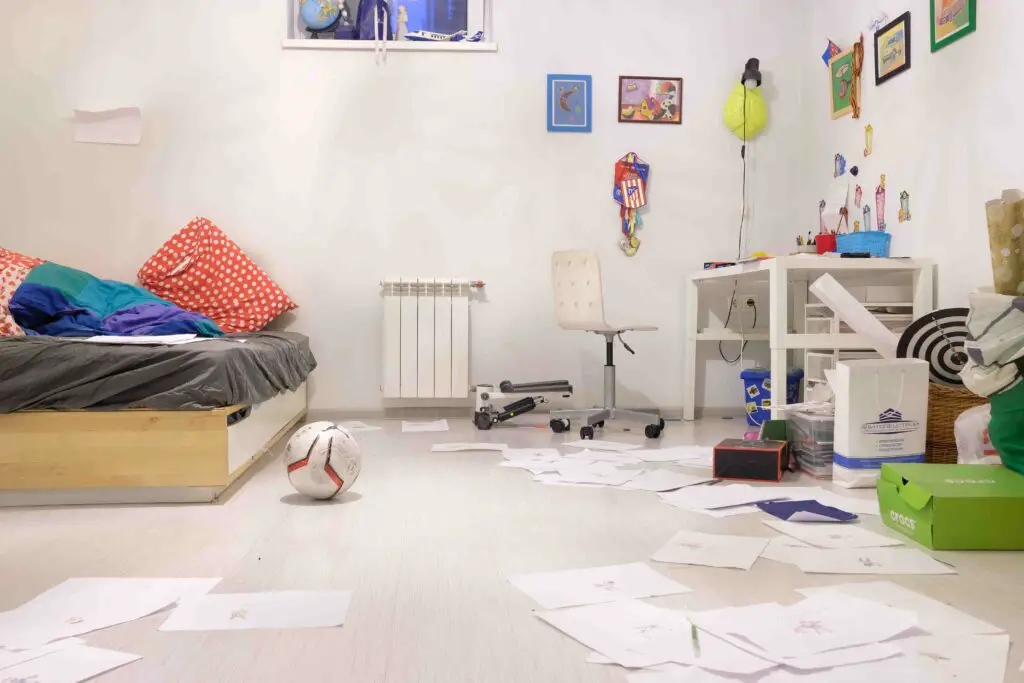While nurturing your child, you get lots of lovely moments that make your heart SWELL WITH PRIDE.
But let’s be HONEST – being a parent isn’t always easy.
Sometimes, frustration and irritation slip in, especially when dealing with challenges that come with raising children.
One of the challenging aspects of parenting is the occasional, or perhaps frequent, irritation that parents may feel toward their children.
This phenomenon can be both confusing and guilt-inducing, leaving parents questioning the reasons behind their emotional responses.
If you’ve ever found yourself wondering, “Why does my child irritate me so much?” rest assured, you’re not alone.
Today, in this blog post, we will guide you about why your child irritates you and how you can tackle them.
So, without procrastinating any further, let’s dash ahead towards it!


Why Does My Child Irritate Me So Much?
Being a parent is both excellent and challenging.
You get tons of love from your child, but sometimes your child irritates you, and you might feel frustrated or angry.
Actually, there are several reasons behind your child’s actions, and you need to understand them to avoid feeling irritated.
Let’s talk about them in detail.
Personal Triggers Can Lead Your Child to Irritate You
Think back to your own childhood – the moments that brought you joy, the challenges you faced, and the feelings that really stuck with you.
Those experiences, whether good or bad, shape how you see and react to your child’s actions.
We call these strong feelings from the past “personal triggers.”
If your child refuses to do what you say, it frustrates you. But why?
It could be that your child’s stubbornness reminds you of when you were young and didn’t like listening to grown-ups. Unconsciously, you’re RELIVING those old emotions all over again through your kid.
These triggers aren’t bad things; they’re just part of being human.
The first step to getting over them is ADMITTING they’re there. When you realize that your annoyance might come from your past, you can choose how to react instead of just reacting without thinking.
So, how do you deal with this?
Take a look at your triggers. Think back on your past, remember those moments, and figure out how they might be affecting your parenting reaction.
It’s not about getting rid of these triggers, but KNOWING them – understanding yourself is the key to understanding your child.


Your Parenting Style Can Be a Problem
Every parent has a different parenting style – some are strict with rules, while others are more lenient.
These styles are influenced by:
- How you were raised
- Your culture
- Your personal beliefs
Perhaps your parenting style might NOT PERFECTLY MATCH your child’s personality – a relaxed child might not fit well with strict rules, or a cautious child might feel lost with a hands-off approach.
But worry not!
The improvement lies in finding a SWEET SPOT – a parenting style that works well with your child. It’s about adjusting what you do while keeping your goals in mind.
So, how do you make your style fit your child’s needs?
- It starts with listening.
- Pay attention to what your child is saying and what they want, and adjust your approach.
- Aim for a balance that respects your authority as a parent and your child’s uniqueness.
As you figure out this balance, you’ll see fewer arguments and more peaceful moments.
Your way of parenting might change a bit, but your dedication to understanding your child makes sure you are going efficiently toward your goals.


Behavioral Challenges Help Him Irritate You
If you’re still wondering why your child acts the way they do, let’s break it down with an example.
Imagine your child doesn’t want to eat veggies. You end up in a FRUSTRATING BATTLE.
But it’s not just about the veggies.
It’s more like your child trying to feel in charge, testing what they’re allowed to do, and finding their voice.
Now, how can you turn these challenging moments into opportunities for your child to grow?
- First play detective. Figure out what’s really going on – are they tired, hungry, or just wanting attention?
- Second, be understanding. Instead of arguing, recognize their feelings and give them choices, but within limits. Let them make some decisions, so they feel in control.
Remember, your child is still learning to handle their emotions, just like you’re learning to guide them. If you respond with patience and understanding, you’re helping them develop emotionally.


Lack of Understanding Between You Two Can Lead You Toward Irritation
What happens when you try talking with your child, but they use a language you don’t know?
It feels frustrating, right?
This is how miscommunication with children often feels – like you’re not really understanding each other.
Let’s break it down.
Your child might show how they feel through ACTIONS, while you expect them to say it with WORDS.
They might want to play when you’re stressed, or you might want them to do homework when they’re tired.
- Use empathy and talk openly.
- When you really care about what they think and feel, you’re inviting them into your world.
- Listen without judging.
- Encourage them to share their feelings, even if it’s through drawings or stories.
Remember, understanding doesn’t always need words.
Now, switch it up.
Share your feelings, too. When you explain why a clean room matters, you’re not just giving rules but sharing what’s important to you.
When rules make sense, they’re easier to follow.
So, when you’re in a conversation that feels confusing, remember – by accepting their unique way of talking and letting them into your way, you’re building a connection that goes beyond words.


Parental Stress Might Be a Problem
How would you feel when you’re juggling a bunch of delicate cups – work stress, bills, family responsibilities – and then you’re asked to hold your child’s hand with the SAME BUSY HANDS?
Stressful, right?
It’s no surprise that sometimes, stress can OVERWHELM US. But don’t worry, because understanding this situation is the key to finding balance.
Let’s discuss it with an example:
You come home after a tough day, feeling on edge. Your child accidentally spills their milk, and suddenly, it feels like a huge problem.
The truth is that external stress can make small issues seem much bigger.
Remember that you’re a WORK IN PROGRESS.
When you take care of yourself, you can take care of others better, just like filling your cup so you have enough to share.
Taking time for yourself isn’t selfish; it’s necessary.
But it’s not just about you. Share your experiences with your child.
Let them know that everyone gets stressed sometimes, and that’s okay. Be a good example by showing them healthy ways to deal with stress.
So, when stress comes knocking, remember – you have the power to let it in for a moment and then send it on its way.


Messy Habits of Your Child Might Irritate You
Picture your child’s room – it’s a bit of a mess with toys, clothes, and DREAMS scattered everywhere.
As a parent, it can be frustrating, but don’t worry. In this chaos, there’s a chance to TEACH your child’s responsibility.
Consider walking into your child’s room and not knowing where to step.
Before you get upset, take a deep breath.
Acknowledged them in a gentle way that being neat isn’t just about having a CLEAN SPACE. It’s about learning to take care of your SURROUNDINGS and respecting shared areas.
Instead of rushing to clean up, ask your child to join in. Make it a game, an adventure where both of you help out.
But remember, BE PATIENT.
- Your child may not organize things the way you do, and that’s fine.
- Let them be creative within the limits you set.
- Guide them gently, showing them how to arrange things while respecting their choices.
So, by cleaning up together, you’re planting seeds of responsibility that will grow as they do.


Disregarding Rules Can Be a Reason for Irritation
When your children keep ignoring their curfew or leaving their toys everywhere, even though you remind them.
It can be frustrating.
But here’s the thing – rules are like a PLAN that helps kids understand how things work.
Sit down with your child and talk about why rules are necessary. Explain why we have rules and how our actions have CONSEQUENCES.
It’s not about punishing them; it’s about learning.
If your child breaks the rules again, calmly follow through with the agreed-upon consequence, like REDUCING their screen time or whatever they do to spend their free time.
But it’s not just about making sure they follow the rules; it’s also about letting them take responsibility.


That’s all. Now, it’s time to move towards the conclusion.
Conclusion
So, why does my child irritate me so much? Now you understand the answer!
Parenting comes with both joys and challenges.
Understanding why your child may sometimes irritate you is crucial for building a healthy parent-child relationship.
Personal triggers from your past, mismatched parenting styles, behavioral challenges, and miscommunication can contribute to frustration.
However, you can strengthen your connection with your child by acknowledging and addressing these issues with empathy, active listening, and a balanced parenting approach.
Ready to build a stronger connection with your child?
Take the first step by implementing these strategies and watch the bond between the two of you flourish.


